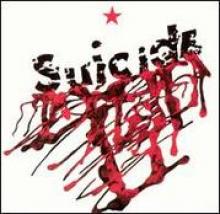Suicide, though, has been pointed to as being the first act to use the word punk on a bill for a show. Of course, the band, formed in 1971, was supposed to have taken its name from a Ghost Rider comic book. The only problem with that is the fact that the comic book character didn’t arrive in the Marvel world until the following year. Whatever the case, Suicide was a part of a scene that accidentally worked to codify punk. That couldn’t have ever been the intention seeing as Suicide worked within its cohort to devise individual styles and outward appearances each different than the band itself.
So much for history. Whatever.
What can be gleaned from all of this mixed up, foggy notion of punk history is the fact that Suicide pre-dates most ensembles that have had the word industrial affixed to its sound. Even Pere Ubu, a Cleveland band that’s frequently given similar credit, wouldn’t exist in any form for about four years after Alan Vega and Martin Rev got together.
The resulting mess doesn’t have a single antecedent. Sources as far a field as music concrete to ‘50s rock and roll can be understood as touchstones for Suicide’s sound. But so too can the howls from campy horror films. Listening to “Johnny Teardrop,” from the pair’s self titled 1977 debut and despite most of the song being an endless bore, Vega yelps as if he’s being pursued by some shadowy murderer. Appropriately, though, Rev works up spooky noises, bleeps and beats from his synthesizers as the song progresses. It’s odd that the topic discussed is the working class and that Bruce Springsteen endeavored to cover the track a few years on.
“Cheree” comes off as a bit more pop oriented with those glistening xylophone tones being spread out over the song’s synth melody. Vega’s crooning here, for the most part, is detached from the howling he gets into a bit further on in the disc. But it’s only a momentary reprieve.
It’d be easy for most punk enthusiasts to dismiss most of the album as unrelated art acts. And that might well be true. But even with that, the fact that “Ghost Rider” opens the album is enough to legitimize the disc in anyone’s mind. Getting covered by Detroit’s the Gories during the ‘80s goes a long way. And in a few modes of thinking that simple transmission from generation to generation could be thought of as Suicide’s greatest accomplishment. Yeah, the duo influenced hordes of synth bands, but spanning a decade and ingratiating ones sound to folks mining a different genre is pretty impressive.
